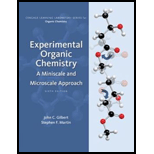Solutions for Experimental Organic Chemistry: A Miniscale & Microscale Approach (Cengage Learning Laboratory Series for Organic Chemistry)
Browse All Chapters of This Textbook
Chapter 3.2 - RecrystallizationChapter 3.3 - Physical Constants: Melting PointsChapter 4.2 - Boiling Points Of Pure LiquidsChapter 4.3 - Simple DistillationChapter 4.4 - Fractional DistillationChapter 4.6 - Steam Distillation: Isolation Of Citral From Lemon Grass OilChapter 5.3 - Base And Acid ExtractionsChapter 5.4 - Extraction Of A Natural Product: TrimyristinChapter 6.2 - Thin-layer ChromatographyChapter 6.3 - Column Chromatography
Chapter 6.4 - Gas-liquid ChromatographyChapter 7.2 - Separation Of Diastereomeric 1,2-cyclohexanediolsChapter 7.3 - Isomerization Of Dimethyl Maleate To Dimethyl FumarateChapter 7.4 - Properties Of The Enantiomers Of CarvoneChapter 7.6 - Resolution Of Racemic 1-phenylethanamineChapter 8.2 - Infrared (ir) SpectroscopyChapter 8.3 - Nuclear Magnetic Resonance (nmr) SpectroscopyChapter 8.4 - Ultraviolet And Visible SpectroscopyChapter 8.5 - Mass SpectrometryChapter 9.2 - Chlorination Using Sulfuryl ChlorideChapter 9.3 - Bromination: Selectivity Of Hydrogen Atom AbstractionChapter 10.2 - Dehydrohalogenation Of Alkyl HalidesChapter 10.3 - Dehydration Of AlcoholsChapter 10.5 - Addition Of Hydrobromic Acid To AlkenesChapter 10.6 - Bromination Of AlkenesChapter 10.7 - Acid-catalyzed Hydration Of AlkenesChapter 10.8 - Hydroboration-oxidation Of AlkenesChapter 19.2 - Grignard Reagents: Preparation
Book Details
Perform chemistry experiments with skill and confidence in your organic chemistry lab course with this easy-to-understand lab manual. Experimental Organic Chemistry: A Miniscale And Microscale Approach, Sixth Edition first covers equipment, record keeping, and safety in the laboratory, then walks you step by step through the laboratory techniques you'll need to perform all experiments. Individual chapters show you how to use the techniques to synthesize compounds and analyze their properties, complete multi-step syntheses of organic compounds, and solve structures of unknown compounds. New experiments in Chapter 17 and 18 demonstrate the potential of chiral agents in fostering enantioselectivity and of performing solvent-free reactions. A bioorganic experiment in Chapter 24 gives you an opportunity to accomplish a mechanistically interesting and synthetically important coupling of two a-amino acids to produce a dipeptide.
Sample Solutions for this Textbook
We offer sample solutions for Experimental Organic Chemistry: A Miniscale & Microscale Approach (Cengage Learning Laboratory Series for Organic Chemistry) homework problems. See examples below:
Solution recrystallization or simply recrystallization is technique that is used for purification of...The formula to calculate mole fraction of substance is as follows: Mole fraction of substance=Mole...During the separation method by separating funnel, the immiscible solvent is added to the solution....C6H5CO2Na is an ionic compound as it is salt of benzoic acid and sodium hydroxide. Since ionic...The relation between wave number and reduced mass is depicted in equation...In NMR studies, there is a common internal standard used, namely TMS, which is volatile liquid and...Considering the bromination and chlorination of an alkane to check the thermodynamic nature of these...The structure of 2-methyl -1-butene is as follows: Important IR stretching frequencies are as...IR spectrum of 1-hexene is as follows: Three signals at frequencies 985 cm−1 , 1650 cm−1 and 3000...
If the groups now are arranged are read from highest towards least in clockwise fashion then R is...The typical infrared absorption frequencies values are given as follows: IR spectrum of (E)-cinnamic...The hydroboration-oxidation productis illustrated as below. Anti-Markovnikov’s Rule serves as the...
More Editions of This Book
Corresponding editions of this textbook are also available below:
Owlv2 With Labskills 24-months Printed Access Card For Gilbert/martin's Experimental Organic Chemistry: A Miniscale & Microscale Approach, 6th
6th Edition
ISBN: 9781305387645
EBK EXPERIMENTAL ORGANIC CHEMISTRY: A M
6th Edition
ISBN: 8220100563812
EBK EXPERIMENTAL ORGANIC CHEMISTRY: A M
6th Edition
ISBN: 9780100563810
EBK EXPERIMENTAL ORGANIC CHEMISTRY: A M
6th Edition
ISBN: 9781305687875
Experimental Organic Chemistry: A Miniscale & Microscale Approach + OWLv2 with LabSkills 24-Months Printed Access Card, (NEW!!)
6th Edition
ISBN: 9781337064521
OWLv2 with LabSkills for Gilbert/Martin's Experimental Organic Chemistry: A Miniscale & Microscale Approach, 6th Edition, [Instant Access], 4 terms (24 months)
6th Edition
ISBN: 9781305387676
Experimental Organic Chemistry: A Miniscale and Microscale Approach (Available Titles CourseMate)
5th Edition
ISBN: 9781111789268
Experimental Organic Chemistry: A Miniscale And Microscale Approach (available Titles Coursemate)
5th Edition
ISBN: 9781439049143
Related Chemistry Textbooks with Solutions
Still sussing out bartleby
Check out a sample textbook solution.
